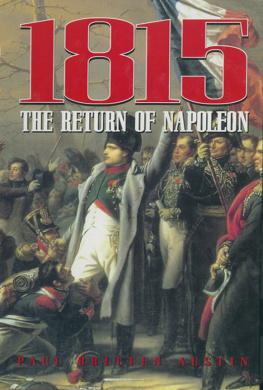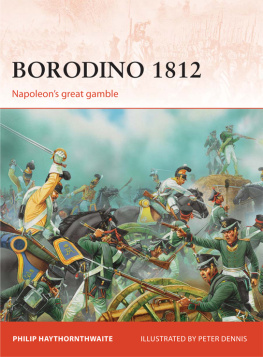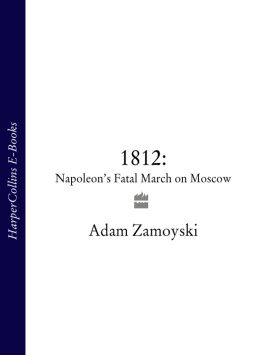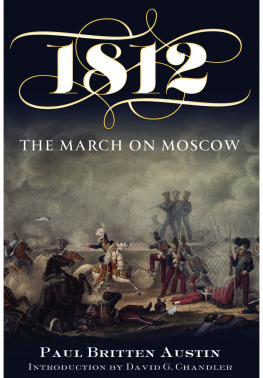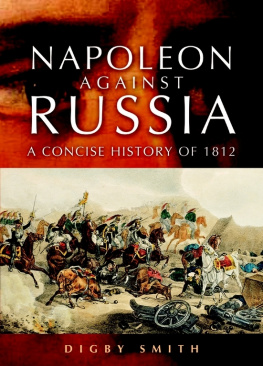The habit of victory cost us even dearer in retreat. The glorious habit of always marching forwards made us veritable shoolboys when it came to retreating. Never was a retreat worse organised.
Caulaincourt
Extreme misery knows not the law of humanity. One sacrifices everything to the law of self-preservation.
Louise Fusil, at the Berezina
I have never, to this day of writing in 1828, seen an account of the retreat that could be described as exaggerated. Indeed Im sure it would be impossible to exaggerate the misery endured by those who took part in it.
Lieutenant Vossler
For the honour of humanity, perhaps, I ought not to describe all these scenes of horror, but I have determined to write down all I saw And if in this campaign acts of infamy were committed, there were noble actions, too.
Sergeant Bourgogne
1812
THE GREAT
RETREAT
PAUL BRITTEN AUSTIN
Greenhill Books
First published in Great Britain in 1996 by
Greenhill Books, Lionel Leventhal Limited
www.greenhillbooks.com
This paperback edition published in 2012 by
Frontline Books
an imprint of
Pen & Sword Books Ltd
47 Church Street
Barnsley
South Yorkshire
S70 2AS
Copyright Paul Britten Austin, 1996
The right of Paul Britten Austin to be identified as the author
of this work has been asserted by him in accordance with the
Copyright, Designs and Patents Act 1988
ISBN 978-1-84832-695-8
All rights reserved. No part of this publication may be reproduced, stored
in or introduced into a retrieval system, or transmitted, in any form, or
by any means (electronic, mechanical, photocopying, recording or
otherwise) without the prior written permission of the publisher. Any person
who does any unauthorized act in relation to this publication may be liable
to criminal prosecution and civil claims for damages.
CIP data records for this title are available from the British Library
For more information on our books, please visit
www.frontline-books.com, email info@frontline-books.com
or write to us at the above address.
Printed and bound by CPI Group (UK) Ltd, Croydon, CR0 4YY
CONTENTS
To the English-speaking worlds
two greatest Napoleonic scholars of our century,
Professor David Chandler, D. Litt. (Oxon)
and
Colonel John R. Elting (USA. Rtd)
this volume is dedicated in admiration and gratitude
for all their kindness and generosity.
I have really nothing to add to the prefaces of the first two volumes of this work: 1812 the March on Moscow and 1812 Napoleon in Moscow except to say that this volume completes the drama of the Russian disaster, as experienced by the invaders and described by them in their own words. For my translation and other methods of presenting my word film the patient reader should turn to the prefaces of those volumes.
The story has of course been told innumerable times. But apart from Sergeant Bourgognes immortal classic, whether the sheer magnitude of the event has wearied authors or their publishers, it has always been, for understandable reasons, in rsum. As the reader will see, there are many first-hand accounts; indeed the body of material Ive drawn on, some 160 participants, has been almost too great, and the fewer the survivors the more detailed their narratives become. First and last my project has been to reconstitute, in maximum close-up, a fragment of past time. Even this, of course, is an illusion. The most objective and circumstantial account adds up to only a millionth part of the reality. Hundreds, perhaps thousands, of other participants must have kept diaries that perished with them in the snows. The mind boggles at the task that would have presented itself if they hadnt! The relevant surviving details have been what has fascinated me. If some are too gruesome for the tender-minded reader I can only suggest he or she skip them; but not their implications. To have omitted them would have been intellectually dishonest. Bellum dulce inexpertis, says Erasmus: How charming is not war to those whove never been in it!
Despite the ever-growing mass of first-hand material (Ive used no others, and new memoirs are always being unearthed), Ive tried to let the whole compose itself into what is, I hope, a kind of outsize symphony, whose first brilliant bars were struck by all the trumpets and drums of the Imperial Guard at the Niemen on that Midsummers Day of 1812 only to end in the few survivors frozen cello tones of horror and despair.
Lastly, on a personal note. My book has taken almost 25 years to compose. If Ive persisted I might almost say had the fortitude long enough to complete it, its not been because of any abiding obsession with military history as such; but because of the striking and manifold glimpses into human nature it affords, until at times the 1812 story has even seemed to be a tragic paradigm of human existence: the outsets overweening optimism, not to say arrogance the flawed calculations the horrific results the raw egoism of survival the staunchness of some, the cowardice and fatuity of others, the heroism and true greatness of a few the friends left by the wayside Homo lupus hominem the leopard, alas, hasnt changed its DNA, as our own unforgivable century has all too amply shown. No philosopher of the pessimist school could want a better instance of what Dr Johnson called the vanity of human wishes, here geometrically demonstrated by what might be called the aesthetic of its own historical logic. Ive had to make nothing up.
My gratitude goes to my publisher Lionel Leventhal for his devotion to a project which in the upshot has run to as many words as there were men in the Grand Army. It was in his office, long ago, our project was conceived. And with it and with me he has had almost half a working lifetimes patience. We are both of us grateful to three experts who have given the text their critical attention: namely, Philip J. Haythornthwaite, Digby Smith and John R. Elting, all themselves distinguished authors in the Napoleonic field. Their keen eyes and immense knowledge have eliminated many an error, larger or smaller. I should also particularly like to thank Assistant Professor Algirdas Jakubcionis of Vilnius University for his ready help in suggesting and providing illustrations; and, once again, Peter Harrington of Brown University, Providence, Rhode Island, USA, for helping with the illustrations.
Dawlish, S. Devon, 1996
| Pierre Auvray, captain, 23rd | Cheval, Corbineaus brigade, II |
| Dragoons. | Corps. |
| Louis Begos, captain adjutant-major, | Dedem van der Gelder, general of |
| 2nd Swiss Infantry Regiment. | brigade, ex-diplomat, attached to |
| Vincent Bertrand, carabinier | IHQ. |
| sergeant, 7th Light Infantry, | Franois Dumonceau, captain commanding |
| Grards division, I Corps. | a company of the 2nd |
| Honor Beulay, sous-lieutenant, 36th | (Red/Dutch) Guard Lancers, |
| Line, Partonneauxs division, IX | Colberts lancer brigade. |
| Corps. | Victor Dupuy, colonel, 7th Hussars, |
| Hubert Biot, captain, ADC to | Bruyres division, 1st Cavalry |
Next page

